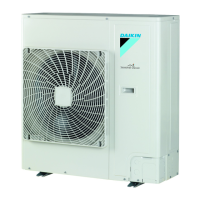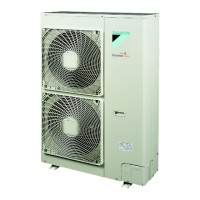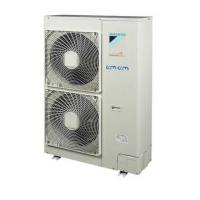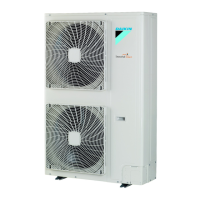
Do you have a question about the Daikin RZQG125L8V1B and is the answer not in the manual?
| Model | RZQG125L8V1B |
|---|---|
| Category | Air Conditioner |
| Brand | Daikin |
| Heating Capacity (BTU/h) | 47800 BTU/h |
| Heating Capacity | 14.0 kW |
| Energy Efficiency Ratio (EER) | 3.61 |
| EER | 3.61 |
| Seasonal Energy Efficiency Ratio (SEER) | 6.1 |
| SEER | 6.40 |
| Coefficient of Performance (Heating) | 4.00 |
| Refrigerant | R32 |
| Outdoor Unit Dimensions (HxWxD) | 320 mm |
| Operating Temperature (Cooling) | -10°C to 46°C |
| Operating Temperature (Heating) | -15 to 24 °C |
Explains the meaning and severity of warnings used in the manual.
Defines key terms like Installation manual, Operation manual, Dealer, Installer, and User.
Crucial safety warnings regarding electrical hazards during installation and servicing.
Warning against touching hot or cold piping and internal parts of the unit.
Outlines the procedures covered for handling and installing RZQ(S)G71~140 units.
General safety and site selection precautions before starting the installation process.
Specific safety measures for handling R410A refrigerant, emphasizing cleanliness and tightness.
Details special features of RZQG models for cold climates and ice build-up prevention.
Lists all accessories included with the unit, with a reference to the figure.
Provides instructions on how to safely lift and carry the outdoor unit.
Criteria for choosing a suitable installation location, ensuring ventilation and accessibility.
Specific guidance for installing outdoor units in low ambient temperatures, considering wind.
Ensures a strong, level installation ground to prevent vibration and noise.
Instructions on securing the unit to prevent it from falling, especially in case of strong winds.
Guidance on proper installation and maintenance of drain piping to prevent water leakage.
Specifies required service space around the unit for proper operation and maintenance.
Details requirements for copper piping material, temper grade, and thickness for R410A.
Recommends appropriate pipe sizes for gas and liquid lines based on model and connection type.
Provides guidelines for selecting branch pipes for twin, triple, and double twin systems.
Lists maximum total and branch pipe lengths and height differences for various configurations.
Covers handling of refrigerant, tools, vacuum pumps, and pressure limits to prevent contamination.
Instructions on making flares, including dimensions, tightening torques, and using correct flare nuts.
Procedures for brazing refrigerant piping using nitrogen to prevent oxidation and contamination.
Explains how to open and close stop valves, including safety precautions and handling tips.
Lists specific torque values for stem caps and service port caps to ensure proper sealing.
Instructions on sealing openings to prevent entry of dirt, dust, or small animals into the unit.
Guidance on connecting field piping and insulating it properly to prevent condensation and contact issues.
Explains when and where to install traps in riser gas piping to ensure oil return.
Outlines the essential steps for leak testing and vacuum drying the refrigerant system.
Lists the necessary equipment and tools required for leak testing and vacuum drying.
Details the methods for performing both vacuum and pressure leak tests on the system.
Step-by-step instructions for removing all moisture from the refrigerant piping.
Details refrigerant type (R410A), GWP, and requirements for labeling the charge amount.
General safety advice and operational guidelines for charging refrigerant into the system.
Provides tables and methods for calculating the extra refrigerant needed based on piping length.
Instructions for performing a full refrigerant recharge, typically after a leak or system maintenance.
Lists total refrigerant weight requirements based on piping length and model type.
Step-by-step guide for performing pump down operation for relocation or disposal, including safety.
Emphasizes safety, compliance, and the need for authorized electricians for all wiring.
Details how to connect the main power supply and the wiring between indoor and outdoor units.
Specific advice on wiring practices, cable management, and terminal connections to prevent faults.
Lists specifications for standard wiring components like wire type, size, and fuses.
A checklist of essential items to verify before initiating a test run of the unit.
Steps to confirm the correct settings of the remote controller for various models.
Step-by-step guide for executing the initial test run of the installed unit in cooling mode.
Important safety and operational notes to observe during the unit's test run phase.
Troubleshooting guide for common issues and error codes encountered during initial installation.
Explains the symbols, color codes, and important notes used in the wiring diagrams.
Lists and defines various electrical components and their abbreviations shown in the diagrams.











